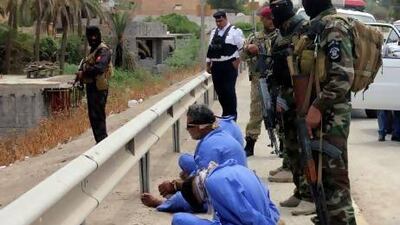BAGHDAD // Fears of a civil war in Iraq grew yesterday after gunmen killed a police officer and his family in Baghdad and a Sunni imam in the Shiite-majority south.
Yesterday's attacks, in which two soldiers were also killed and eight police officers kidnapped, followed three days of bombings and other violence that killed 130 people.
A market, a mosque and bus stops in both Shiite and Sunni areas were targeted in scenes reminiscent of retaliatory attacks between the two groups that pushed the country to the brink of a civil war in 2006-2007.
"The escalation of terrorist acts that targeted Shiites and Sunnis, including bombing of Shiite and Sunni mosques, aims to ignite a sectarian war between Iraqis," said Ammar Tohme, leader of the Shiite Fadilah party.
In yesterday's deadliest attack, gunmen broke into the Baghdad home of Capt Adnan Ibrahim, an anti-terrorism police officer, and killed him, his wife and their two children, aged 8 and 10, as they slept.
The attackers also killed another police officer who tried to stop them at a nearby checkpoint as they were leaving the area.
In the western Sunni-majority province of Anbar, gunmen kidnapped eight police officers guarding a post on the main highway linking Iraq to Jordan and Syria.
Anbar was in the grip of Al Qaeda's local affiliate, the Islamic State of Iraq, when Sunni-Shiite bloodshed was at its height in 2006-07, and the group has regained strength in recent months.
"The Islamic State of Iraq has found in the recent protests in the Sunni provinces a fertile environment for restructuring and formation of new armed factions," said Nouri Al Dulaiyme, an independent military analyst.
Earlier in the day, security forces and gunmen clashed in the area when police tried to arrest a Sunni tribal sheikh suspected of being behind the killing of three army intelligence officers stopped by gunmen near a protest site in Ramadi last month.
Iraqi authorities had offered a bounty for the arrest or information leading to the arrest of Khamis Abu Risha and two other people they say were linked to the killings.
The fighting, near Mr Abu Risha's house north of Ramadi, left three people wounded. No arrests were made. Gunmen later deployed near the main entrance of Anbar Operations Command headquarters in Ramadi, 115 kilometres west of Baghdad.
The Ramadi area is one of the main centres of the Sunni protest movement in Iraq, which began almost five months ago.
Tensions are festering between the Shiite-led government of prime minister Nouri Al Maliki and Iraq's Sunni minority, which accuses the authorities of marginalising and targeting their community, including through wrongful detentions and accusations of involvement in terrorism.
Sunnis have been staging street protests against Mr Al Maliki since December, and a bloody government raid on a Sunni protest camp in Hawija last month ignited a surge of violence.
Monthly death tolls are well below those of 2006-07, when they sometimes topped 3,000, but more than 700 were killed in April, according to a UN tally, the highest figure in almost five years.
Elsewhere, in the southern city of Basra, gunmen shot and killed a Sunni imam, Assad Nassir, as he was leaving his house.
Two soldiers were also killed and two others wounded when a roadside bomb struck a group of soldiers arriving to inspect the scene of a blast that took place earlier in the northern city of Mosul.
A security official said a roadside bomb hit a police patrol in the northern suburbs of Baghdad, killing one policeman and wounding two others.
* Additional reporting by the Associated Press and Reuters

